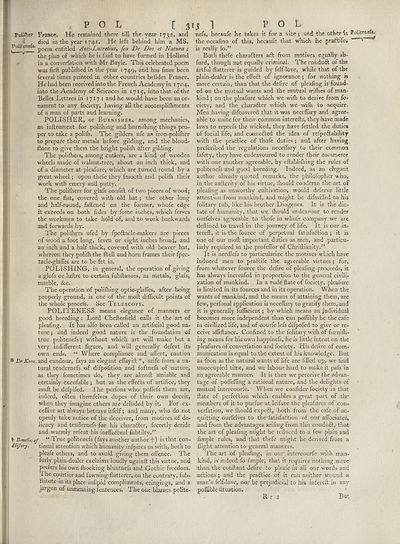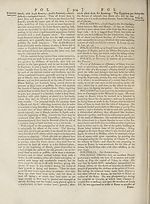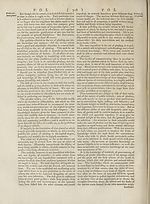Encyclopaedia Britannica > Volume 15, PLA-RAM
(355) Page 315
Download files
Complete book:
Individual page:
Thumbnail gallery: Grid view | List view

Politenef*.
POL [ 3.
poUfter Trascp. He remained there till the year 1732, and
died in the year 1741. He left behind him a MS.
poem entitled Anti-Lucretiusy feu De Deo et Natura ;
the plan of which he is faid to have formed in Holland
in a converfation with Mr Bayle. This celebrated poem
was firll publifhed in the year 1749, and hag fince been
feveral times printed in other countries beiides France.
He had been received into the French Academy in 1704,
into the Academy of Sciences in 1715, into that of the
Belles Lettres in 1717: and he would have been an or¬
nament to any fociety, having all the accomplilhments
of a man of parts and learning.
POLISHER, or Burnisher, among mechanics,
an inftrument for polilhing and burnifhing things pro¬
per to take a polilh. The gilders ufe an iron-poliiher
to prepare their metals before gilding, and the blood-
ftone to give them the bright polifh after gilding.
The polifhers, among cutlers, are a kind of wooden
wheels made of walnut-tree, about an inch thick, and
of a diameter at pleafure, which are turned round by a
great wheel; upon thefe they fmooth and polifh their
w’ork with emery and putty.
The polifhers for glafs confifl of two pieces of wood;
the one flat, covered with old hat ; the other long
and half-round, faftened on the former, whofe edge
it exceeds on both fldes by fome inches, which ferves
the workmen to take hold of, and to wrork backwards
and forwards by.
The polifhers ufed by fpedtacle-makers are pieces
of wood a foot long, feveti or eight inches broad, and
an inch and a half thick, covered with old beaver hat,
whereon they polifh the {hell and horn frames their fpec-
tacle-glaffes are to be fet in.
POLISHING, in general, the operation of giving
a glofs or luftre to certain fubftances, as metals, glafs,
marble, &c.
The operation of polifh ing optic-glafies, after being
properly ground, is one of the moll difficult points of
the whole procefs. See Telescope.
POLITENESS means elegance of manners or
good breeding : Lord Chefterfield calls it the art of
pleafing. It has alfo been called an artificial good na¬
ture ; and indeed good nature is the foundation of
true politenefs; without which art will make but a
very indifferent figure, and will generally defeat its
own ends. “ Where compliance and affent, caution
* Lr Knox, and candour, fays an elegant effayift*,' arife from a na¬
tural tendernefs of difpofition and foftnefs of nature,
as they fometimes do, they are almoft amiable and
certainly excufable; but as the effects of artifice, they
muff be defpifed. 1 he perfons who poffefs them are,
indeed, often themfelves dupes of their own deceit,
when they imagine others are deluded by it. For ex-
ceffive art always betrays itfelf; and many, who do not
openly take notice of the deceiver, from motives of de¬
licacy and tendernefs for his character, fecretly deride
and warmly refent his ineffeftual fubtilty.”
4 Beautiesef “ True politenefs (fays another author f) is that con-
(iijlory. tinual attention which humanity infpires us with, both to
pleafe others, and to avoid giving them offence. The
furly plain-dealer exclaims loudly -againft this virtue, and
prefers his own fhocking bluntnefs and Gothic freedom.
I he courtier and fawning flatterer, on the contrary, fub-
futute in its place infipkl compliments, cringings, and a
jargon of unmeaning leniences. The one blames polite--
s 1 L 0. L
nefs, becaufe he takes it for a vice ; and the other L Politeaeft.
the occafion of this, becaufe that which he praftifei
is really fo.”
Both thefe characters aft from motives equally ab-
furd, though not equally criminal. The conduft of the
artful flatterer is guided by felf-love, w'hile that of the
plain-dealer is the effeft of ignorance ; for nothing »
more certain, than that tire defire of pleafing is found¬
ed on the mutual wants and the mutual wifhes of man¬
kind ; on the pleafure which we wiih to derive from fo¬
ciety, and the charafter which we wifh to acquire.
Men having difcovered that it was neceffary and agree¬
able to unite for their common intereils, they have made
laws to reprefs the wicked, they have fettled the duties
of focial life, and connefted the idea of refpeftability
with the praftice of thofe duties ; and after having
preferibed the regulations neceffary to their common
fafety, they have endeavoured to render their commerce
with one another agreeable, by eftablifhing the rules of
politenefs and good breeding. Indeed, as an elegant
author already quoted remarks, the philofopher who,
in the auflerity of his virtue, fhould condemn the art of
pleafing as unworthy cultivation, would deferve little
attention from mankind, and might be difmiffed to his
folitary tub, like his brother Diogenes. It is the dic¬
tate of humanity, that we fhould endeavour to render
ourfelves agreeable to thofe in whofe company we are
defiined to travel in the journey of life. It is our in-
terefl, it is the fource of perpetual fatfsfaftion ; it is
one of our moll important duties as men, and particu¬
larly required in the profeffor of Chriflianity.”
It is needlefs to particularize the motives which have
induced men to praftife the agreeable virtues; for,
from whatever fource the defire of pleafing proceeds, it
has always inereafed in proportion to the general civili¬
zation of mankind. In a rude flate of fociety, pleafure
is limited in its fonrees and in its operation. When the
wants of mankind, and the means of attaining them, are
few, perfonal application is neceffary to gratify them, and
it is generally fufficient; by which means an individual
becomes more independent than can poffibly be the cafe
in civilized life, and of courfe lefs difpofed to give or re¬
ceive affiftance. Confined to the folitary wifh of furnifli-
ing means for his own happinefs, he is little intent on the
pleafures of converfation and fociety. His defire of com¬
munication is equal to the extent of his knowledge. But
as foon as the natural wants of life are filled up, we find
unoccupied time, and we labour hard to make it pafs in
an agreeable manner. It is then we perceive the advan¬
tage of poffeffing a rational nature, and the delights of
mutual intercourfe. When we confider fociety in that
ftate of perfeftion which enables a great part of the
members of it to purfue at leifure the pleafures of con¬
verfation, we fhould expeft, both from the eafe of ac¬
quitting ourfelves to the fatisfaftion of our affociates,
and from the advantages arifing from this conduft, that
the art of pleafing might be reduced to a few plain and
fimple rules, and that thefe might be derived from a
flight attention to general manners.
The art of pleafing, in our intercourfe with man¬
kind, is' indeed fo fimple, that it requires nothing more
than the conflant defire to pleafe in all our words and
aftions ; and the praftice of it can neither wound a
man’s felf-love, nor be prejudicial to his infereft in any
poffible lit nation.
R r 2 But
POL [ 3.
poUfter Trascp. He remained there till the year 1732, and
died in the year 1741. He left behind him a MS.
poem entitled Anti-Lucretiusy feu De Deo et Natura ;
the plan of which he is faid to have formed in Holland
in a converfation with Mr Bayle. This celebrated poem
was firll publifhed in the year 1749, and hag fince been
feveral times printed in other countries beiides France.
He had been received into the French Academy in 1704,
into the Academy of Sciences in 1715, into that of the
Belles Lettres in 1717: and he would have been an or¬
nament to any fociety, having all the accomplilhments
of a man of parts and learning.
POLISHER, or Burnisher, among mechanics,
an inftrument for polilhing and burnifhing things pro¬
per to take a polilh. The gilders ufe an iron-poliiher
to prepare their metals before gilding, and the blood-
ftone to give them the bright polifh after gilding.
The polifhers, among cutlers, are a kind of wooden
wheels made of walnut-tree, about an inch thick, and
of a diameter at pleafure, which are turned round by a
great wheel; upon thefe they fmooth and polifh their
w’ork with emery and putty.
The polifhers for glafs confifl of two pieces of wood;
the one flat, covered with old hat ; the other long
and half-round, faftened on the former, whofe edge
it exceeds on both fldes by fome inches, which ferves
the workmen to take hold of, and to wrork backwards
and forwards by.
The polifhers ufed by fpedtacle-makers are pieces
of wood a foot long, feveti or eight inches broad, and
an inch and a half thick, covered with old beaver hat,
whereon they polifh the {hell and horn frames their fpec-
tacle-glaffes are to be fet in.
POLISHING, in general, the operation of giving
a glofs or luftre to certain fubftances, as metals, glafs,
marble, &c.
The operation of polifh ing optic-glafies, after being
properly ground, is one of the moll difficult points of
the whole procefs. See Telescope.
POLITENESS means elegance of manners or
good breeding : Lord Chefterfield calls it the art of
pleafing. It has alfo been called an artificial good na¬
ture ; and indeed good nature is the foundation of
true politenefs; without which art will make but a
very indifferent figure, and will generally defeat its
own ends. “ Where compliance and affent, caution
* Lr Knox, and candour, fays an elegant effayift*,' arife from a na¬
tural tendernefs of difpofition and foftnefs of nature,
as they fometimes do, they are almoft amiable and
certainly excufable; but as the effects of artifice, they
muff be defpifed. 1 he perfons who poffefs them are,
indeed, often themfelves dupes of their own deceit,
when they imagine others are deluded by it. For ex-
ceffive art always betrays itfelf; and many, who do not
openly take notice of the deceiver, from motives of de¬
licacy and tendernefs for his character, fecretly deride
and warmly refent his ineffeftual fubtilty.”
4 Beautiesef “ True politenefs (fays another author f) is that con-
(iijlory. tinual attention which humanity infpires us with, both to
pleafe others, and to avoid giving them offence. The
furly plain-dealer exclaims loudly -againft this virtue, and
prefers his own fhocking bluntnefs and Gothic freedom.
I he courtier and fawning flatterer, on the contrary, fub-
futute in its place infipkl compliments, cringings, and a
jargon of unmeaning leniences. The one blames polite--
s 1 L 0. L
nefs, becaufe he takes it for a vice ; and the other L Politeaeft.
the occafion of this, becaufe that which he praftifei
is really fo.”
Both thefe characters aft from motives equally ab-
furd, though not equally criminal. The conduft of the
artful flatterer is guided by felf-love, w'hile that of the
plain-dealer is the effeft of ignorance ; for nothing »
more certain, than that tire defire of pleafing is found¬
ed on the mutual wants and the mutual wifhes of man¬
kind ; on the pleafure which we wiih to derive from fo¬
ciety, and the charafter which we wifh to acquire.
Men having difcovered that it was neceffary and agree¬
able to unite for their common intereils, they have made
laws to reprefs the wicked, they have fettled the duties
of focial life, and connefted the idea of refpeftability
with the praftice of thofe duties ; and after having
preferibed the regulations neceffary to their common
fafety, they have endeavoured to render their commerce
with one another agreeable, by eftablifhing the rules of
politenefs and good breeding. Indeed, as an elegant
author already quoted remarks, the philofopher who,
in the auflerity of his virtue, fhould condemn the art of
pleafing as unworthy cultivation, would deferve little
attention from mankind, and might be difmiffed to his
folitary tub, like his brother Diogenes. It is the dic¬
tate of humanity, that we fhould endeavour to render
ourfelves agreeable to thofe in whofe company we are
defiined to travel in the journey of life. It is our in-
terefl, it is the fource of perpetual fatfsfaftion ; it is
one of our moll important duties as men, and particu¬
larly required in the profeffor of Chriflianity.”
It is needlefs to particularize the motives which have
induced men to praftife the agreeable virtues; for,
from whatever fource the defire of pleafing proceeds, it
has always inereafed in proportion to the general civili¬
zation of mankind. In a rude flate of fociety, pleafure
is limited in its fonrees and in its operation. When the
wants of mankind, and the means of attaining them, are
few, perfonal application is neceffary to gratify them, and
it is generally fufficient; by which means an individual
becomes more independent than can poffibly be the cafe
in civilized life, and of courfe lefs difpofed to give or re¬
ceive affiftance. Confined to the folitary wifh of furnifli-
ing means for his own happinefs, he is little intent on the
pleafures of converfation and fociety. His defire of com¬
munication is equal to the extent of his knowledge. But
as foon as the natural wants of life are filled up, we find
unoccupied time, and we labour hard to make it pafs in
an agreeable manner. It is then we perceive the advan¬
tage of poffeffing a rational nature, and the delights of
mutual intercourfe. When we confider fociety in that
ftate of perfeftion which enables a great part of the
members of it to purfue at leifure the pleafures of con¬
verfation, we fhould expeft, both from the eafe of ac¬
quitting ourfelves to the fatisfaftion of our affociates,
and from the advantages arifing from this conduft, that
the art of pleafing might be reduced to a few plain and
fimple rules, and that thefe might be derived from a
flight attention to general manners.
The art of pleafing, in our intercourfe with man¬
kind, is' indeed fo fimple, that it requires nothing more
than the conflant defire to pleafe in all our words and
aftions ; and the praftice of it can neither wound a
man’s felf-love, nor be prejudicial to his infereft in any
poffible lit nation.
R r 2 But
Set display mode to:
![]() Universal Viewer |
Universal Viewer | ![]() Mirador |
Large image | Transcription
Mirador |
Large image | Transcription
Images and transcriptions on this page, including medium image downloads, may be used under the Creative Commons Attribution 4.0 International Licence unless otherwise stated. ![]()
| Encyclopaedia Britannica > Encyclopaedia Britannica > Volume 15, PLA-RAM > (355) Page 315 |
|---|
| Permanent URL | https://digital.nls.uk/191905391 |
|---|
| Attribution and copyright: |
|
|---|
| Description | Ten editions of 'Encyclopaedia Britannica', issued from 1768-1903, in 231 volumes. Originally issued in 100 weekly parts (3 volumes) between 1768 and 1771 by publishers: Colin Macfarquhar and Andrew Bell (Edinburgh); editor: William Smellie: engraver: Andrew Bell. Expanded editions in the 19th century featured more volumes and contributions from leading experts in their fields. Managed and published in Edinburgh up to the 9th edition (25 volumes, from 1875-1889); the 10th edition (1902-1903) re-issued the 9th edition, with 11 supplementary volumes. |
|---|---|
| Additional NLS resources: |
|

